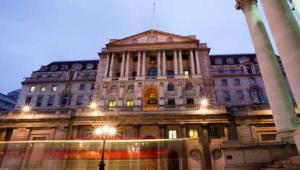The Bank of England will introduce two new stimulus packages to boost bank lending in response to the ‘heightened uncertainty’ over the state of the economy, governor Sir Mervyn King has revealed.
Speaking at last night’s Lord Mayor’s Banquet at the Mansion House in the City of London, King said that the current ‘exceptional circumstances’ required further loans to banks to act as a ‘bridge to calmer times’.
Analysts suggested that the schemes could provide £140bn worth of funding.
Under one proposal, the Bank will provide loans to high street banks at below market rates, so they can then increase lending to the wider economy.
This ‘funding for lending’ plan, which should be in place within a few weeks, would tackle the high-level costs of loans directly, said King, alongside the government’s existing credit easing policy.
He also announced that the Bank would activate powers to make additional loans to banks to ensure they have enough liquidity to deal with ‘exceptional market stress’, such as possible shocks from the eurozone.
Last December, the Bank created, but did not activate, an Extended Collateral Term Repo Facility, under which auctions of short-term sterling liquidity could be held at any time. These will now take place monthly, starting on June 20, with each auction worth a maximum of £5bn. All financial firms registered to use the Bank’s Discount Window Facility, which already provides short-term liquidity, will then be eligible to borrow the money raised.
Announcing the plan, King said: ‘The black cloud of uncertainty has created extreme private sector risk aversion. Should the public sector, therefore, take upon itself some of those risks? Or put another way, should we collectively take on risks in return for lower compensation than we would demand as individuals?
‘In present circumstances, when private sector spending is depressed by extreme uncertainty, there may be a case for a scheme to underwrite risks which the market itself is unwilling to take.’
Chancellor George Osborne said that the ‘co-ordinated action’ would ‘inject new confidence into our financial system and support the flow of credit to where it is needed in the real economy’.
He added: ‘Together we can deploy new firepower to defend our economy from the crisis on our doorstep. Funding for lending to the family aspiring to own their home and the business that wants to expand. Liquidity for our high street banks. The government – with the help of the Bank of England – will not stand on the sidelines and do nothing as the storm gathers.’
The Centre for Economics and Business Research observed that the new funds could provide up to £140bn in ‘what is effectively another form of quantitative easing more closely targeted at bank lending’.
Chief executive Douglas McWilliams said: ‘The Treasury has indicated that they think that the scheme will be a success if it leads to an additional £80bn of lending.
‘I doubt if the mechanism will have more than a marginal impact on most forms of corporate lending. But it might have an effect in two areas: commercial property and home mortgages.’




















